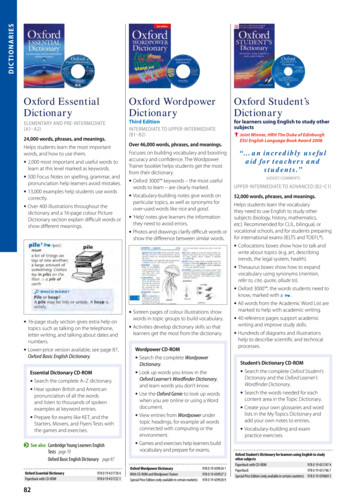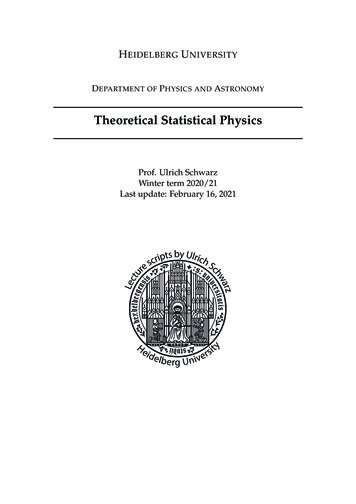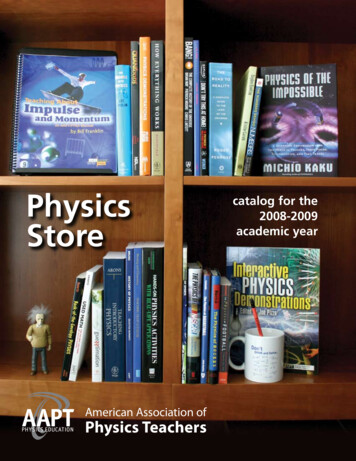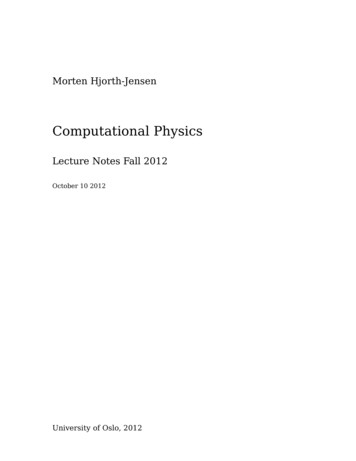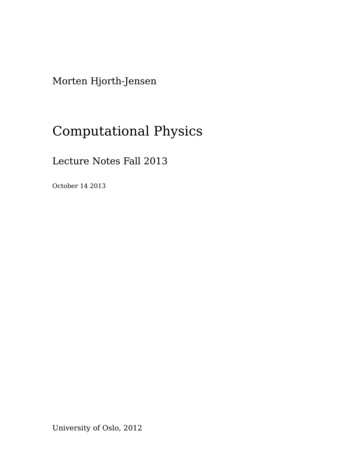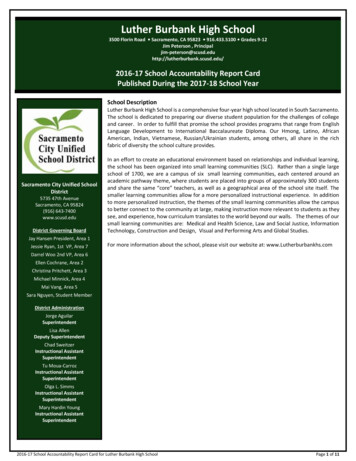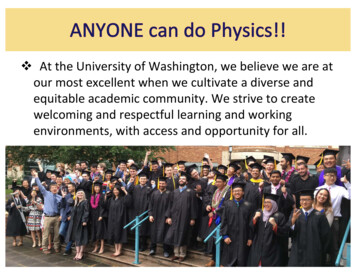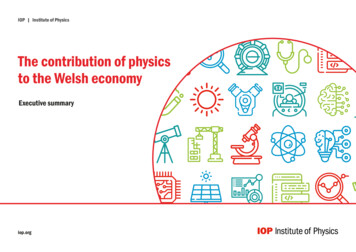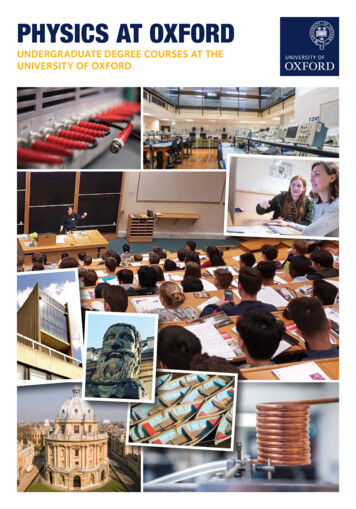
Transcription
PHYSICS AT OXFORDUNDERGRADUATE DEGREE COURSES AT THEUNIVERSITY OF OXFORD
PHYSICS AT OXFORDPhysics is about unravelling the complexity of the universe to discover how and why it works.Discoveries in physics form the foundation of countless technological advances and play animportant role in many scientific areas. The contributions of physics to solving global problemssuch as energy production, environmental protection, global warming and public health areessential and have an enormous impact on our society. It is an exciting and challenging fieldto study, requiring an adventurous and inquiring mind, and good mathematical abilities. Therewards include a deeper understanding of the world around us and the development of skillsthat are highly sought after by many employers.THE COURSEThere are two undergraduate physics degrees,a three year BA and a four year MPhys. Allapplicants apply for the four year MPhys in thefirst instance. We also offer a four year jointdegree in Physics and Philosophy.BA PHYSICSThe three year course provides a generaleducation in the basic principles of physics andincludes a group industrial project.TEACHINGOxford has a unique approach to undergraduatephysics teaching, drawing on the breadth andquality of the Department’s research programmeand a wealth of expertise. Teaching involvesboth the Physics Department and the Colleges.The Physics Department determines subjectmatter, arranges lectures and practicals, and setsand marks examinations. The Colleges organisetutorials, where work is submitted and discussed,and also provide pastoral support and advice.LECTURESLectures normally happen in the department and willbe the primary source of information. Lectures willbe for the entire year, approximately 180 students.TUTORIALSTutorials give students direct and regular accessto physicists actively involved in research andprovide an opportunity to explore scientific ideasface-to-face with experts in the field. Tutors takea personal interest in the academic progress oftheir students and offer help and advice. Studentsnormally have two tutorials or classes a week.1MPHYSMost students study the four year course, inwhich they pursue two fields up to the researchfrontier and complete a longer project. TheMPhys should be of interest to those who seek apossible career in research.MPHYSPHILPhysics and philosophy are studied in parallelfor the first three years and then students mayspecialise in one subject or continue with both.Classes are typically with their College year group(approximately six students), while tutorials arewith one or two other students.PRACTICAL WORKExperimental work forms an important part of anyphysics degree, providing training in transferableskills such as communication, teamwork andproblem solving, in addition to learning aboutmeasurements and instrumentation. Practicalwork is compulsory for the first three years;students spend on average one day a week in thelaboratories. Some useful skills (computing andelectronics) are taught almost entirely throughpractical work. The first year of the practicalcourse provides basic training in experimentalphysics and computing. In the second and thirdyear there is a choice of practicals includingelectronics, thermal physics, computing, optics,biophysics, astrophysics, atmospheric physics,nuclear physics and condensed matter physics.Students can also do extra practicals in place of awritten short option in the second year. A student’sfinal year project often involves experimental workin the teaching laboratories or in a research group.1ST YEAR2ND YEARCurrent coursesCurrent courses Classical mechanics and Thermal physicsspecial relativity Electromagnetism andoptics Electromagnetism,circuit theory and optics Quantum physics Mathematical methods Mathematical methods Differential equations Practical workand waves 12 days spread overPractical workthe year, experimentscan include thermal 17 days spread overthe year, experimentscan include optics,electronics andcomputingShort options, eg: Astronomy Complex analysis Quantum ideasphysics, computing andopticsShort options, eg: Classical mechanics Climate physics Introduction tobiological physics3RD YEAR4TH YEARCurrent coursesResearch FluidsResearch Project and Symmetry and relativity two option courses: Atomic and laser MPhys project physicsprojects give studentsvaluable experience of Nuclear and particleopen-ended work andsolving real problems,and are the equivalentof about one full term’sworkphysics General relativity Condensed matterphysics Computational andexperimental projectsPractical work 6 days plus a miniprojectShort options, eg: Advanced quantummechanics Classical mechanics Plasma physicsAssessmentAssessmentAssessmentFirst Universityexaminations: Fourwritten papers; shortoption paper; satisfactorylaboratory workFinal Universityexaminations, Part A (BAand MPhys): Three writtenpapers; short optionpaper; laboratory work;individual presentationFinal Universityexaminations, Part A:MPhys: up to 5 writtenpapers, short option paper,mini project, laboratoryworkBA: up to 4 writtenpapers, short option paper,mini project, laboratorywork, project report,optional industrial projectCurrent major options Astrophysics Laser science and quantum informationprocessingCondensed matterParticle physicsAtmospheres andoceansTheoretical physicsBiological physicsAssessmentFinal Universityexaminations, Part C(MPhys): Project report;two major option papersMMATHPHYS 4TH YEARThe Physics and Mathematics Departments jointly offer an integrated master’s level course in Mathematical andTheoretical Physics. Physics students are able to apply for transfer to a fourth year studying entirely mathematicaland theoretical physics, completing their degree with an MMathPhys. The course offers research-level trainingin: Particle physics, Condensed matter physics, Astrophysics, Plasma physics and Continuous media. With a greatnumber of options offered from both the Mathematics and Physics departments this course may be of particularinterest to those intending graduate study in theoretical topics. For full details see mmathphys.physics.ox.ac.uk.The course descriptions provided are correct at time of publication, but details are subject to change.WHY STUDY PHYSICS ATOXFORD?Studying Physics at Oxford is brilliant: not only does it equip youwith the tools to understand and pick apart this fascinating subject,but it trains your brain to attack all manner of problems in anefficient and intelligent way.2
4TH YEAR OPTIONSMPhys students spend their fourth year workingon two major options and a substantial project. Theoptions reflect specialisms within the department:Astrophysics, Biological Physics, CondensedMatter Physics, Laser Science and QuantumInformation Processing, Particle Physics, Physics ofAtmospheres and Oceans and Theoretical Physics.These options are taught in lectures and classes.FINAL YEAR PROJECTSIn the final year (3rd year for BA, 4th year forMPhys), students will have the option to choosefrom a wide range of projects in fundamentalphysics. In addition, BA students can choose tostudy a real-life industrial physics problem with anexternal company. The goal of these projects is togive all students valuable experience of exploringwhat research can look like and what they cancontribute to solving real problems, independentof whether they will continue in academia, industryor elsewhere. These projects are the equivalent toabout one full term’s work.OPTIONAL UNITSThe physics undergraduate degrees at Oxford offerstudents a significant amount of choice throughshort option courses, laboratory experimentsand two major options in the fourth year of theMPhys. Short option courses allow students toexperiment with new material. All students havethe opportunity to either acquire expertise in amore specialised area of physics or to broadentheir education by studying subjects outside theARE TUTORIALS TERRIFYING?3mainstream course, offered by another departmentor faculty. A sample of short optional courses arelisted below:Course Title Astrophysics: from Planets to the Cosmos Introduction to Biological Physics Classical Mechanics Climate Physics Energy Studies Exploring Solar Systems Functions of a Complex Variable Exoplanets Plasma Physics Quantum Ideas Advanced Quantum Mechanics Stars and GalaxiesFrom other departments or faculties History of Science Language Option (French, Spanish or German) Philosophy of Quantum Mechanics Philosophy of Science Philosophy of Space-Time Teaching and Learning Physics in SchoolsTutorials were initially scary, because you are satacross from someone who is an expert in their field.But once you realise that they don’t mind if you getthings wrong, the environment is incredible. A tutorwill never hesitate to ask difficult questions, and willpush you to fully understand. I’ve walked away fromtutorials feeling so pleased that I’m here because itis the best teaching I’ve ever had.PHYSICS AND PHILOSOPHYOxford also offers a joint Physics and Philosophy Masters degree (MPhysPhil), which aims tobridge the arts/science divide. Physics and philosophy complement each other as they bothseek to reach a fundamental understanding of the nature of reality.In this degree students will learn how to write,reason and argue with precision, as well as how touse physical principles and mathematical equationsto solve problems. Graduates are equipped withthe ability to think in abstract and general termsas well as to evaluate scientific claims that arise inareas such as social sciences, policy making, mediaand business. In addition, depending on students’choices in the fourth year, the course providesan ideal springboard to graduate work in eitherphysics or philosophy. Graduates regularly go onto the very best research programmes worldwidein physics, and likewise in philosophy. The coursecovers topics in physics, philosophy and thephilosophy of physics.PHYSICS AND PHILOSOPHYPhysics and philosophy are studied in parallel forthe first three years. Philosophy covers topicssuch as the theory of knowledge, metaphysics,philosophy of science and logic. There is flexibilityin the fourth year to specialise in either physics orphilosophy, or to continue with both.PHILOSOPHY OF PHYSICSLinking physics and philosophy throughout thecourse is the subject area of Philosophy of Physics.Topics covered include classical space-timeconcepts, foundations of special relativity,conceptual problems in quantum mechanics,concepts of symmetry and foundations of generalrelativity and statistical mechanics. This course isamongst the most demanding at Oxford. Studentsare expected to become as fluent in mathematicsas their single honours peers in physics, and asskilled in writing essays as those taking other jointdegrees involving philosophy.COLLEGE CHOICENot all colleges accept applications for Physics andPhilosophy. Some colleges will take Physics andPhilosophy students only occasionally (typically onein every year or two years); others have a policyof attempting to take at least two students peryear in the course if possible. These Colleges havesuch a policy: Balliol, Brasenose, Merton, Oriel,Pembroke, St Edmund Hall, St Hilda’s, Somerville,University.4
CAREERSSTUDENT PROFILEA degree in physics is a valued qualification and provides a pathway into a wide variety ofrewarding careers. This is reflected in the diversity of employers, such as energy companies,research laboratories, banks, government agencies and engineering firms, who actively targettrained physicists.A day in the life of Maria, 3rd year MPhysA CAREER IN RESEARCHCareers in research are rewarding, withopportunities to travel and collaborate with otherresearchers across the globe. A large proportion(40%) of graduates at Oxford take higher scientificdegrees such as DPhil/PhD qualifications; thefirst steps in an academic career in research.Fundamental research in physics can help usunderstand the nature of our universe. Physicistsspecialise in topics ranging from galaxies to quarks,and clouds to crystals. Physics also plays animportant role in the development of technology.At Oxford, for example, quantum computing is anexciting area of research, as is work in medicineto develop techniques such as proton therapy.Physics research can also help to solve globalproblems, such as improving the efficiency of solarcells to meet the increasing demand for energy indeveloping countries.USING YOUR KNOWLEDGEPhysics graduates often use their knowledge andskills in areas other than academic research. Forexample, many physics graduates also work inindustry; working for companies that specialisein areas such as energy, instrumentation,audio and visual technology, defence andtelecommunications. They also go on to workas engineers, medical physicists, teachers, TVscience advisors, environmental scientists, sciencejournalists, writers, editors for scientific journalsand in many other fields, e.g. specialising in lawinvolving intellectual property and patents.USING YOUR SKILLSYou may decide you don’t want to work in aphysics-related job; however the broad skillsacquired by physics students are in high demand,especially in professions requiring analytical, ITand numerate problem solving abilities such ascomputing, finance and technical consultancy.Physicists have an ability to grasp concepts quickly,along with a determination to find coherentanswers. Their ability to understand and modelcomplex systems, for example, lends itself to avariety of different careers such as computergames design and financial forecasting. Studyingphysics is not only very enjoyable but is anexcellent preparation for the world of work.8:00Wake up and go for a run round Addison’s Walk (a path around the deer park!) in my college,Magdalen. Then make a bowl of porridge in the upstairs kitchen9:00Work on a fluid dynamics problem sheet in the college library9:40Walk through Oxford to lectures (the Physics Department is 15 minutes from my college).Attend three lectures on atomic physics, special relativity and chaos theory13:00 Have lunch with college friends in the OKB (Old Kitchen Bar)14:00 Tutorial in college on atomic physics. We discuss the Rabi Oscillations in atoms (where an atomoscillates between an excited and ground state, then collapses into one state when observed)15:00 Go to the library to review what I learnt in the tutorial and continue working on my fluiddynamics sheet for tomorrow’s tutorial16:00 Give a college tour to Year 10 students as a Magdalen student ambassador and finish theproblem sheet for tomorrow’s tutorial18:00 Go to Magdalen’s Medieval Hall for dinner with friends19:00 I may go to a Physics Society talk; play casual college badminton or partake in the collegephilosophy discussion group (discussing anything from art, to God and time travel, over wine)21:00 Sort out emails and plan the next day or catch up on work in the library if I have a deadline22:00 Meet my friends for tea in someone’s roomWHAT HAVE YOU ENJOYED?WHY DID YOU CHOOSEOXFORD?The main reason I chose Oxford wasthe tutorial system. I also thought thecollege structure would suit me; acampus within the city gives a readymade pool of people from all subjectsto make friends with.5I’ve really enjoyed the breadth and depth of third yearlabs. One week I’m cooling a semiconductor to 0.6Kwith liquid helium, observing quantum physics at theforefront of current research. Another I’m essentiallyblindly recreating a classic experiment in the optics darkroom with goggles, gloves and an apron, developing afilm that shows the absorption spectrum of sodium.6
ADMISSIONSWe seek to recruit highly-motivated students who have exceptional ability in physics andmathematics. Successful applicants need to be able to analyse and solve problems using alogical approach and see how one part of a physical system connects with another. They alsoneed to have an ability to give precise explanations both orally and numerically.ENTRANCE REQUIREMENTSCandidates are expected to have Physics andMathematics to A-level, Advanced Higher, IBHigher Level or other equivalent. The standardoffer is A*AA at A-level or the equivalent,specific details can be found at www.ox.ac.uk/admissions/undergraduate coursesAn A-level or an AS-level in Further Mathematicsmay be helpful for students taking this course,however it is not an admissions requirementOPEN DAYSPotential applicants are invited to join us at anOpen Day in June or July, or a smaller InformationDay in September. Booking for Physics Open Daysis not required. Many Colleges also hold events onthese days and you should contact the Collegesto confirm booking requirements. For moreinformation see www.ox.ac.uk/admissionsHOW TO APPLYFor a five-step process on how to apply see www.ox.ac.uk/admissions/undergraduate courses/applying to oxfordFor more information about the course and how toapply, visit www.physics.ox.ac.uk/study-hereSTUDENT FINANCEThe cost of studying is an increasingly importantconsideration when applying to university. Thefunding arrangements for students entering highereducation are available on the University website:www.ox.ac.uk/fundingupdateThis page also includes information about theUniversity’s generous support package for studentsfrom lower income households in the form oftuition fee waivers and bursariesAPPLICATION CALENDAREarly SeptemberApplications are made through UCASwww.ucas.com15 OctoberFinal deadline for registering for the PhysicsAptitude Test. Your school will need to havesubmitted your details via the CambridgeAssessment Admissions Testing’s secure EntriesExtranet. More information can be found here:www.admissionstestingservice.org/patClosing date for all UCAS applicationsOctober/NovemberAll applicants must sit the Physics Aptitude TestDecemberInterviews take place in Oxford, more informationis available on the Physics website: lications/interviewsBy mid January of the following yearYou will be notified of the outcome of yourapplicationAugustIf you have been made a conditional offer and youmeet the conditions of the offer, your Collegewill confirm your place after the publication ofexamination resultsWeb links are correct at time of publication, but these aresubject to change, please see www.ox.ac.uk/admissionsCover images top row, bottom right and inset top right, andlarge image p5: John Cairns Photography; other images Hannah Glanville, Media Services Unit,Dept. of Physics and Sian TedaldiDesign: www.catherinecharnock.co.ukIssued by Department of Physics 05/19www.physics.ox.ac.ukDepartment of Physics, Clarendon Laboratory, Parks Road, Oxford, OX1 3PU
The Physics and Mathematics Departments jointly offer an integrated master's level course in Mathematical and Theoretical Physics. Physics students are able to apply for transfer to a fourth year studying entirely mathematical and theoretical physics, completing their degree with an MMathPhys. The course offers research-level training


